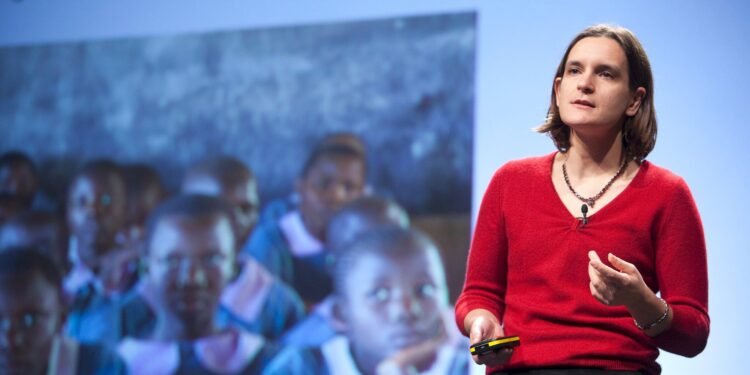What if the key to solving global poverty isn’t one big idea, but thousands of small, tested solutions? This question drives the revolutionary work of Nobel laureate Esther Duflo.
Her approach transformed development economics by using scientific experiments. Instead of theories, she focuses on real-world evidence.
Duflo co-founded the Abdul Latif Jameel Poverty Action Lab (J-PAL). This organization tests policies through randomized controlled trials. Their research has helped millions worldwide.
In 2019, she won the Nobel Memorial Prize in Economic Sciences. She was the youngest winner and only the second woman to receive this honor. Her work proves that careful study can create better policies for fighting poverty.
Key Takeaways
- Esther Duflo revolutionized economics by using randomized controlled trials.
- She won the 2019 Nobel Prize in Economic Sciences for her innovative approach.
- Her work focuses on finding practical solutions to global poverty.
- J-PAL, which she co-founded, has influenced policies affecting millions.
- Duflo’s methods emphasize evidence over theory in development economics.
- She has received numerous awards including the John Bates Clark Medal.
- Her research provides actionable insights for policymakers worldwide.
Who Is Esther Duflo and Why Her Work Matters
Understanding the person behind groundbreaking economic research helps us appreciate its real-world impact. This Nobel laureate’s journey from Paris to MIT reveals how personal experiences shape professional missions.
Early Life and Academic Background
Born in Paris in 1972, this future economist grew up in an academic family. Her mathematician father and pediatrician mother influenced her analytical thinking. Her mother’s humanitarian work particularly inspired her early interest in poverty issues.
She attended prestigious French schools including Lycée Henri-IV and École Normale Supérieure. Initially studying history, she shifted to economics after working with Jeffrey Sachs in Moscow. This experience revealed how economic tools could address social problems.
She pursued her passion at the Massachusetts Institute of Technology, earning her PhD in 1999. Her advisors included Abhijit Banerjee and Joshua Angrist. This training ground shaped her experimental approach to economics.
Her early research in Indonesia provided causal evidence that schooling increases earnings. This work demonstrated her commitment to evidence-based solutions. She joined MIT’s faculty immediately after graduation, becoming one of their youngest tenured professors.
Winning the Nobel Prize in Economic Sciences
In 2019, she received the ultimate recognition in her field. At age 46, she won the prize economic sciences alongside Abhijit Banerjee and Michael Kremer. The Royal Swedish Academy of Sciences noted their experimental methods now dominate development economics.
The Nobel Committee highlighted their work in transforming development economics through randomized controlled trials. This approach breaks down complex problems into testable questions. Their methods have become the gold standard in economic research.
She made history as the second woman and youngest person to win this prize. This achievement emphasizes the importance of evidence-based policy in fighting global challenges. Her work continues to influence how we approach economic development worldwide.
The Experimental Approach of Esther Duflo
Imagine treating economic policy like medicine – testing each intervention before widespread implementation. This radical rethinking way fight global challenges defines the Nobel laureate’s groundbreaking methodology.
Her approach brought laboratory precision to field research in development economics. Instead of relying on theoretical models, she built evidence through careful experimentation.
Pioneering Randomized Controlled Trials in Economics
Esther Duflo introduced randomized controlled trials (RCTs) into economic sciences. She adapted medical research methods to test policy interventions with scientific rigor.
RCTs randomly assign people to treatment or control groups. This allows researchers to measure exact impacts of specific programs.
Her work with Abhijit Banerjee and Michael Kremer established this methodology. They demonstrated how controlled experiments could generate reliable evidence for fighting global poverty.
This approach transformed development economics from theoretical to empirical. Policymakers now had data-driven insights into what actually works.
Breaking Down Global Poverty into Smaller, Testable Questions
The economist advocates decomposing massive problems into manageable components. Instead of asking “how to end poverty,” she examines specific barriers.
Her research addresses precise questions about teacher performance, healthcare access, and financial inclusion. Each study builds toward comprehensive solutions.
In India, she tested educational approaches through the poverty action lab network. The research revealed tailored teaching methods outperformed generic solutions.
Customized instruction proved more effective than textbook distribution. This precise finding helped educators improve actual learning outcomes.
This methodology has been adopted worldwide by researchers and policymakers. It represents a fundamental shift toward evidence-based approaches in economic development.
Founding and Leading the Abdul Latif Jameel Poverty Action Lab (J-PAL)
Can a single research organization change how governments fight poverty globally? The answer emerged in 2003 when three visionary economists established what would become a powerhouse in evidence-based policy.
Esther Duflo, along with Abhijit Banerjee and Sendhil Mullainathan, launched J-PAL at the Massachusetts Institute of Technology. Their goal was revolutionary: bring scientific rigor to development economics through randomized controlled trials.
Mission and Global Reach of J-PAL
J-PAL’s mission focuses on reducing poverty by ensuring policies rest on solid evidence. The organization tests interventions across critical areas including health, education, and financial inclusion.
What began at one university now spans the globe. J-PAL maintains regional offices across six countries and collaborates with 900 researchers from 97 universities worldwide.
This extensive network allows the poverty action lab to conduct ground-breaking studies in diverse contexts. Their work adapts to local needs while maintaining scientific standards.
Impact on Policy and Millions of Lives
J-PAL’s research has directly influenced policies in 84 countries. Their evidence-based approach has reached over 450 million people facing economic hardship.
One remarkable example transformed healthcare in India. By offering small incentives like lentils, an immunization program increased vaccination rates sixfold. This simple change demonstrated how behavioral insights can drive massive improvements.
The Teaching at the Right Level program represents another success. This educational approach tailors instruction to students’ actual learning levels rather than prescribed curricula. It has significantly improved outcomes across developing nations.
Through these and countless other initiatives, J-PAL continues its vital work. The organization bridges academic research and real-world impact, proving that evidence-based approaches can effectively fight global poverty.
Key Research Contributions and Findings
Can carefully designed experiments reveal unexpected truths about poverty alleviation strategies? The Nobel laureate’s groundbreaking work across multiple domains demonstrates how evidence-based approaches can challenge conventional wisdom in development economics.
Her research spans education, gender dynamics, and financial inclusion. Each study provides actionable insights for policymakers worldwide.
Education: Teaching at the Right Level and School Incentives
In the field of education, rigorous testing revealed surprising results about what actually improves learning outcomes. Standard interventions like textbook distribution showed limited impact compared to targeted approaches.
The Teaching at the Right Level (TaRL) method proved particularly effective. This approach customizes instruction based on students’ actual learning levels rather than age or grade.
Studies in India and Ghana demonstrated significant learning gains with this method. It has since been adopted widely across developing nations.
This work with Abhijit Banerjee transformed how educators approach learning challenges. Their research emphasized practical solutions over theoretical assumptions.
Gender: Intra-Household Resource Allocation
Gender dynamics play a crucial role in economic development and poverty reduction. Research on South African pension systems revealed important insights about resource allocation.
When grandmothers controlled household resources, young girls’ health outcomes improved significantly. This finding highlighted how gender influences economic decision-making.
The study underscored the importance of women’s empowerment in fighting poverty. It demonstrated that resource control affects family welfare in measurable ways.
These findings have influenced global discussions on gender equality. They provide empirical evidence for policies that support women’s economic participation.
Microfinance: Evaluating Its True Impact on Poverty
Microfinance was once hailed as a miracle solution for global poverty. Rigorous evaluation revealed a more complex reality about its effectiveness.
Research in Hyderabad, India showed that while microcredit helped some start businesses, it didn’t consistently increase overall consumption. The impact on poverty reduction was more limited than many assumed.
This work prompted a reevaluation of microfinance as a development tool. It emphasized the need for more nuanced financial interventions tailored to specific contexts.
The study contributed to better understanding of what works in economic development. It demonstrated the value of evidence-based approaches over ideological solutions.
Conclusion
How do we measure true impact in economic development? The Nobel laureate’s work demonstrates that lasting change comes from evidence-based approaches rather than theoretical ideals.
Through Abdul Latif Jameel Poverty Action Lab, Esther Duflo and Abhijit Banerjee have transformed how we understand global challenges. Their research provides practical solutions for education and poverty reduction.
Duflo continues to shape economic policy while teaching at MIT and leading the Paris School of Economics. Her books like “Poor Economics” and “Good Economics for Hard Times” make complex social sciences accessible to all.
The legacy of this pioneering economist lies in her commitment to empirical evidence. Her methods remain essential for addressing today’s most pressing economic issues.
FAQ
What is Esther Duflo best known for in economics?
She is best known for pioneering the use of randomized controlled trials (RCTs) in development economics. This experimental approach allows researchers to test the effectiveness of specific policies and programs aimed at reducing poverty with scientific rigor.
Why did Esther Duflo win the Nobel Prize?
Esther Duflo, along with Abhijit Banerjee and Michael Kremer, was awarded the 2019 Sveriges Riksbank Prize in Economic Sciences in Memory of Alfred Nobel for their experimental approach to alleviating global poverty. Their work transformed development economics into a more evidence-based field.
What is J-PAL and what is its mission?
J-PAL, the Abdul Latif Jameel Poverty Action Lab, is a global research center co-founded by Esther Duflo and Abhijit Banerjee. Its mission is to reduce poverty by ensuring that policy is informed by scientific evidence. J-PAL conducts evaluations of social programs and helps scale those that are proven to work.
How has Esther Duflo’s work impacted real-world policy?
Her research has directly influenced policies worldwide. For example, the “Teaching at the Right Level” (TaRL) approach, which her work helped validate, has been adopted to improve education for millions of children in India and Africa by focusing instruction on a child’s current learning level.
What is a key finding from her research on microfinance?
A key finding is that while microfinance does not typically lead to dramatic increases in income or transformative business growth for the average borrower, it does provide valuable financial security and flexibility, helping poor households manage cash flow and invest in opportunities.
How does her work address gender inequality?
Her research has explored intra-household resource allocation, revealing how power dynamics within families affect spending on items like education and nutrition. This work provides insights for designing policies that can more effectively empower women and improve outcomes for children.





